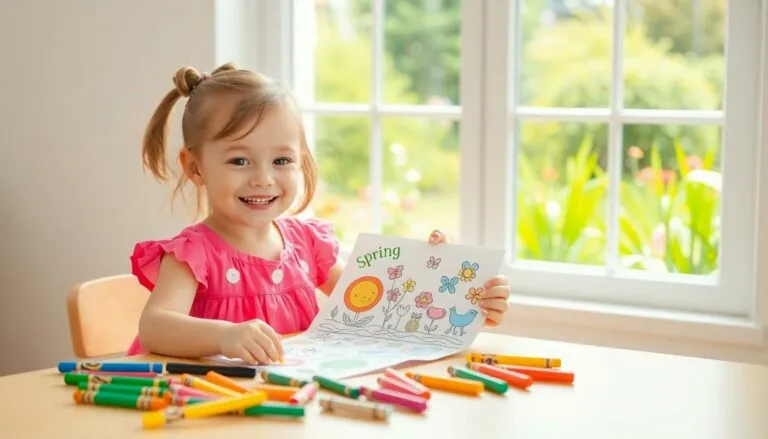Table of Contents
ToggleNavigating the energetic world of preschoolers can feel like trying to herd cats on caffeine. For some little ones, the challenge is even greater, as ADHD can turn everyday activities into a whirlwind of chaos. Understanding ADHD in preschoolers is crucial for parents and educators alike, as it paves the way for effective strategies that help these vibrant children thrive.
Imagine a classroom where crayons fly like confetti and attention spans are shorter than a goldfish’s memory. It’s not just a scene from a comedy; it’s a reality for many families. By recognizing the signs of ADHD early on, caregivers can provide the support that transforms these pint-sized tornadoes into focused learners. With the right tools and a sprinkle of patience, the journey through preschool can become a delightful adventure for everyone involved.
Understanding ADHD in Preschoolers
ADHD in preschoolers involves a complex set of behaviors that can challenge parents and educators alike. Recognizing these behaviors early can lead to effective support and interventions.
Definition and Symptoms
ADHD, or Attention-Deficit/Hyperactivity Disorder, affects a child’s ability to focus, control impulses, and regulate activity levels. Symptoms often manifest as inattention, hyperactivity, and impulsivity. Inattention presents as difficulty following instructions or staying on task. Hyperactivity may appear as constant movement or an inability to sit still. Impulsivity leads to hasty actions without considering the consequences. These behaviors often disrupt classroom learning and social interactions, making it crucial to identify them promptly.
Diagnosis Criteria
Diagnosis of ADHD in preschoolers relies on specific criteria outlined in the DSM-5. Symptoms must occur in two or more settings, such as home and school, to ensure a comprehensive understanding of the child’s behavior. The symptoms should persist for at least six months and significantly impair functioning. Caregivers must provide detailed observations, and clinicians may use screening tools to assess symptoms. A thorough evaluation often includes gathering information from teachers and the child’s parents to ensure accurate diagnosis. Negative influences from other factors must also be ruled out before confirming ADHD.
Causes of ADHD in Preschoolers
ADHD in preschoolers arises from a combination of factors. Understanding these causes helps in early identification and management.
Genetic Factors
Genetic factors play a significant role in the development of ADHD. Studies indicate that children with ADHD often have family members who also exhibit similar symptoms. Specific genes linked to dopamine regulation may contribute to hyperactivity. Mutations in these genes can affect neurotransmitter functions. Research supports that if a parent has ADHD, a child may inherit increased risk. Twin studies further show that identical twins exhibit a higher concordance for ADHD compared to fraternal twins.
Environmental Influences
Environmental influences also significantly contribute to ADHD. Factors such as prenatal exposure to tobacco smoke or alcohol can increase the likelihood of developing ADHD symptoms. High levels of lead exposure during early childhood have been linked to impulsivity and attention difficulties. Chaotic home environments can exacerbate behavioral issues, impacting emotional and cognitive development. Early neglect or trauma may further increase the risk of ADHD. Understanding these influences enables caregivers to create supportive environments.
Impact of ADHD on Preschoolers
ADHD greatly affects preschoolers by influencing their social interactions and academic progress. It disrupts their ability to engage with peers and absorb educational content.
Social Development
Social development poses significant challenges for children with ADHD. These children often struggle to form and maintain friendships. Impulsivity can lead to inappropriate behaviors, making peer interactions difficult. They may unintentionally interrupt conversations or dominate playtime, causing frustration among peers. These behaviors can result in social isolation over time. The inability to follow social cues may hinder the development of essential communication skills. Supportive environments help these children learn to engage positively with others. Through guidance, they can develop better social strategies.
Academic Challenges
Academic challenges frequently arise due to the symptoms of ADHD. Attention difficulties make it hard for preschoolers to focus during lessons. Distractions in the classroom can prevent effective learning. Hyperactivity may lead to restlessness, causing disruptions that affect both the child and classmates. Children often lag behind peers in acquiring foundational skills in literacy and numeracy. Young learners with ADHD may require tailored instructional strategies to succeed. Early intervention and specialized support can enhance their educational experiences. Adaptations in teaching methods help address individual learning needs, promoting a more inclusive classroom.
Treatment Options for Preschoolers
Treatment options for preschoolers with ADHD focus on strategies that enhance behavior and support development. Effective management often combines behavioral therapy with medication when appropriate.
Behavioral Therapy
Behavioral therapy serves as a primary intervention for young children with ADHD. This approach uses positive reinforcement techniques to encourage desired behaviors while minimizing negative ones. Therapists work with both children and parents, equipping families with strategies to manage symptoms at home. Techniques may include setting clear expectations, using visual schedules, and implementing reward systems to foster responsibility. By actively engaging preschoolers in structured activities, caregivers can help them channel their energy productively. Regular feedback and data collection during therapy sessions ensure adjustments align with the child’s progress.
Medication Considerations
Medication considerations for preschoolers with ADHD require caution and thorough evaluation. Stimulant medications, like methylphenidate and amphetamines, may be effective but typically aren’t the first line of treatment for young children unless symptoms severely impair functioning. Non-stimulant options, such as atomoxetine, exist for those who may not tolerate stimulants well. Parents should collaborate with healthcare providers to determine the need for medication based on specific behaviors and challenges. Regular follow-ups and monitoring of side effects ensure the chosen treatment plan supports the child’s overall well-being while minimizing potential risks.
Strategies for Parents and Educators
Supporting preschoolers with ADHD involves practical strategies that enhance their learning experiences. Parents and educators can work together to create an environment that fosters success.
Creating a Supportive Environment
Establishing a structured routine benefits preschoolers with ADHD. Consistent schedules allow children to anticipate activities, providing a sense of stability. Designating a quiet, distraction-free space aids focus during tasks and homework. Visual cues such as charts and pictures can guide children through daily activities, promoting independence. Engaging activities that channel excess energy into constructive play enhance learning. Encouraging breaks helps children recharge, allowing them to return to tasks with improved attention. Additionally, maintaining clear expectations supports emotional regulation and minimizes behavioral challenges.
Effective Communication Techniques
Effective communication techniques play a crucial role in managing ADHD symptoms. Using simple, concise language ensures clarity for preschoolers. Positive reinforcement motivates children to follow instructions and engage in desired behaviors. Collaborating with educators fosters a consistent approach, reinforcing messages both at home and in school. Monitoring non-verbal cues enhances understanding; children often communicate needs through body language. Developing empathy while discussing challenges helps build trust and rapport. Allowing children to express their thoughts encourages open dialogue, promoting emotional expression and confidence in communication.
Conclusion
Understanding ADHD in preschoolers is vital for fostering an environment where these children can thrive. By recognizing the signs and implementing effective strategies, parents and educators can transform challenges into opportunities for growth. Early intervention not only aids in academic success but also enhances social interactions, promoting healthier relationships with peers.
With the right support and tailored approaches, preschoolers with ADHD can navigate their unique journeys more successfully. It’s essential for caregivers to remain proactive and engaged in their child’s development, ensuring they receive the necessary tools to flourish both in and out of the classroom. The journey may be demanding, but the rewards of seeing these children thrive are immeasurable.








